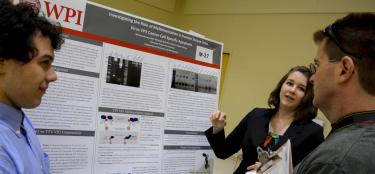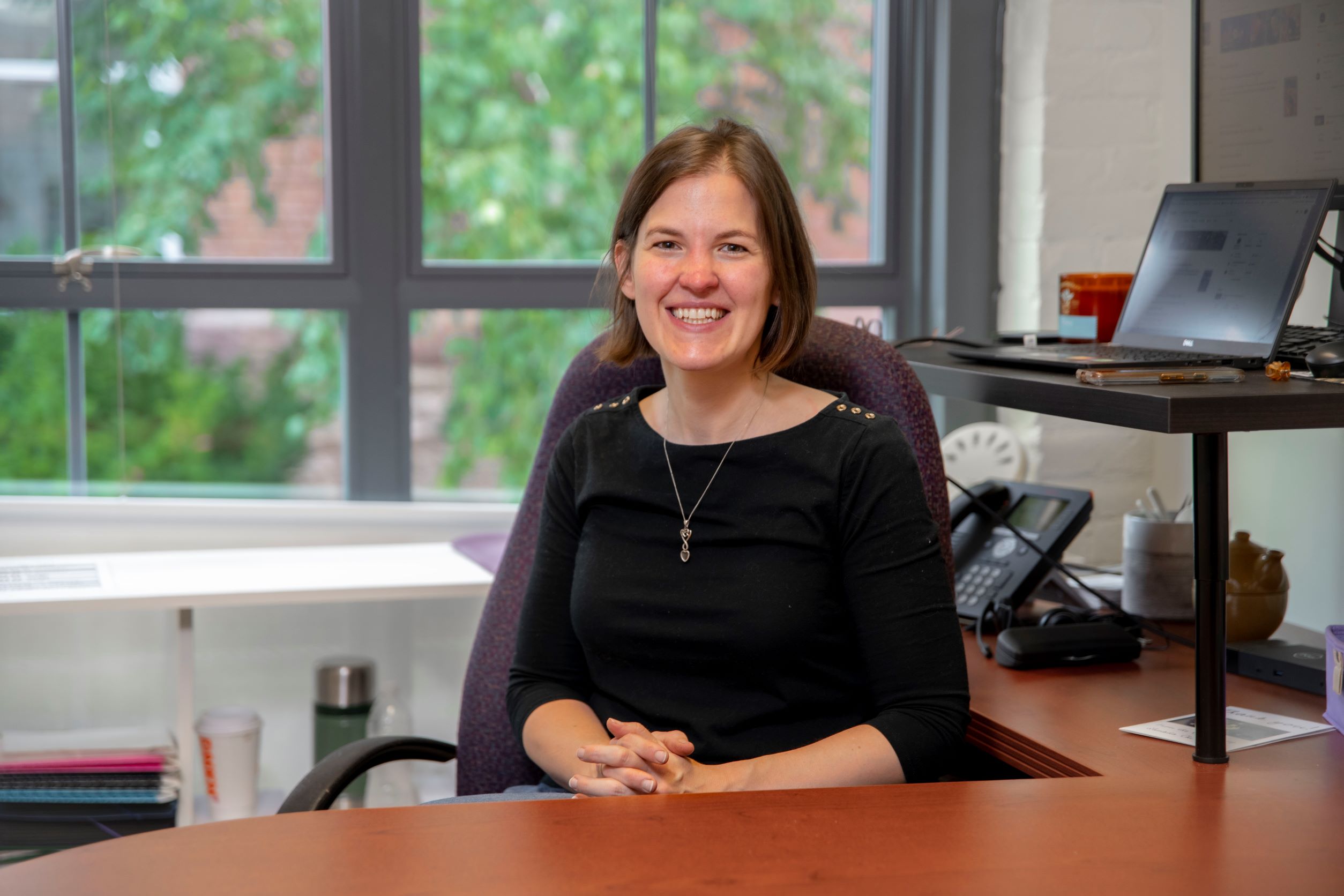Great Problems Seminar

The Great Problems Seminar (GPS) is a two-term course that immerses first-year students into university-level research and introduces them to the project-based curriculum at WPI. As part of The Global School at WPI, the course gives students and faculty the opportunity to step outside their disciplines to solve problems focused on themes of global importance. This culminates in annual Poster Presentation Days that celebrate students’ innovative research on a wide range of solutions to some of the world’s most critical challenges. Alumni report significant gains from their GPS experience, citing the strong preparation for all stages of WPI's project- and team-based curriculum, as well as positive impacts on their job readiness.
Great Problems Seminar Courses – A/B Term
Climate Change
Global climate change is here, from sea level rise, to stronger storms, and more dangerous wildfire seasons – just to name a few impacts. What does it mean to live in this new environment? What does it mean for our ecosystems and civilization? How can we adapt to a new and unpredictable climate and mitigate practices that could lead to further warming? We will examine the causes and consequences of climate change on the environment and people, incorporating a local to global approach. Both scientific (environment, ecology, wildlife, weather events) and humanistic (politics, ethics, economics, social justice) pieces of the climate puzzle will be investigated. This course will place a special emphasis on valuing differential impacts on vulnerable people and habitats. While working toward identifying a problem that your team can solve, you will build skills in critical thinking, teamwork, communication, and ethics.
This GPS carries 1/3 unit BB1000 credit and 1/3 unit INTL1000 (counts towards HUA) credit.
Course numbers FY 1100 sand FY 1101
Extinctions
Throughout most of Earth’s history, species disappeared at an average rate of 1 to 5 per year, and fossil evidence shows that five mass extinction catastrophes have occurred. Scientists estimate that we are witnessing the sixth mass extinction. Where are extinctions currently having the greatest impact? How might conservation efforts prevent them? This Great Problems Seminar examines debates about past and present causes of extinction, the factors that contribute to vulnerability or resiliency of endangered species, and the consequences of species loss, including the links with pathogenic outbreaks such as the COVID-19 pandemic.
This GPS carries 1/3 unit CH1000 credit and 1/3 unit SSPS1000 credit.
Course numbers FY 1100 and FY 1101
Heal the World
What are the greatest threats to global health? The climate crisis? Lack of access to needed nutrition and health care? Substance abuse and mental wellbeing? Access to green spaces? In this hands-on course, students will work in teams to research and develop technological, biological, policy-driven, and other types of solutions to help answer these questions in cases around the world. Student project groups will explore issues of inequity, resource scarcity, and historical barriers to access, and design ethical, sustainable solutions based on their research.
This GPS carries 1/3 unit CH1000 credit and 1/3 unit SSPS1000 credit.
Course numbers FY 1100 and FY 1101
Our Unequal World
Why does inequality continue to increase even as the global economy grows? Has it always been this way? Is the US really number 1? Is the growing inequality both within and between countries inevitable? If not, how can it be addressed through social infrastructure? This course will examine the causes of inequality both in the US and abroad, examining historical, cultural, and political factors that influence how global inequality has reached such heights. In the second part of the course, we will explore and develop strategies for addressing issues of inequality experienced in our local community.
This GPS carries 1/3 unit BUS1000 credit and 1/3 unit SS1000 credit.
Course numbers FY 1100 and FY 1101
Recover, Reuse, Recycle
This course focuses on material resources and reusing them—recycling. It blends engineering with humanities and builds a framework for the world in which students will live, showing them how they can make the world different through their ingenuity and innovation. Policy and societal issues are also discussed in the context of the recovery and recycling. Students collaborate with the NSF Center for Resource Recovery and Recycling (CR3) and work on projects sponsored by leading global corporations.
This GPS carries 1/3 unit ES 1000 credit and 1/3 unit HU1100 credit.
Course numbers FY 1100 and FY 1101
Seeking Sustainability
If the moment we are living in has revealed anything, it is that our contemporary modes of life are deeply unsustainable. The world’s ecosystems and social systems are vulnerable to a number of accelerating threats from environmental degradation and climate change to economic inequality and environmental injustice. The recent global pandemic has added to this and shone a light on unsustainability while also giving us a glimpse of a possible future with reduced fossil fuel use and carbon emissions. In this class we will look at these problems from a number of perspectives and try to understand what a transition to a more sustainable mode of existence might entail.
This GPS carries 1/3 unit SS1000 credit and 1/3 unit HU1100 credit.
Course numbers FY 1100 and FY 1101
Shelter the World
How do you provide shelter for over 7 billion people, almost half of whom live on less than $5.50 a day? With rising slum populations, increasing natural disasters, and overflowing refugee camps, how do we address the growing demands for safe living spaces? What do we need to understand as designers, engineers, or aid workers to provide shelter for the world? Working in teams in this design studio, we will learn design concepts, the Design-Build process, materials, and structure to address this housing challenge. We will create a model that is affordable, safe, and appropriate for our selected population.
This GPS carries 1/3 unit CE1000 credit and 1/3 unit SSPS1000 credit.
Course numbers FY 1100 and FY 1101
Smart and Sustainable Cities
Smart city tools deploy sensors in the urban environment to aid public service provision, resource management, law enforcement, hiring practices, and other critical areas of living and working in cities. Artificial intelligence supercharges these possibilities. These technologies reflect the prevailing social values of our society – they express the legacies and current realities of social injustice and represent sites of experimentation for more socially just futures. What values are designed into the tools and sensors? How do they reflect histories of race, class, and gender? How do they engage and empower? How do they remake the city and the relationship between humans, nature, and technology.
This GPS carries 1/3 unit ES 1000 credit and 1/3 unit SS1000 credit.
Course numbers FY 1100 and FY 1101
Great Problems Seminar Courses – C/D Term
AI, Design, and Society
What does it mean to be human in an increasingly digital world? In AI, Design, and Society we will explore the history and future of artificial intelligence, and imagine new futures with, or without, AI. Join this class to get hands-on opportunity to build and use AI systems, understand their role in our society, and design interactive experiences that depict, integrate, and critique the role of AI in our daily lives. Through your project work, you will gain skills in interdisciplinary teamwork, user experience design, and programming.
Credits: This GPS carries 1/3 unit CS 1000 credit and 1/3 unit SS1000 credit.
Course numbers FY 1100 and FY 1101
Humanitarian Engineering
This course explores the concepts of development, technology, and water access in a remote region of southwest Morocco, where indigenous people have historically been denied access to basic human rights, including water and sanitation. In recent decades, climate change and other factors have further damaged the water access of these rural villages. To both study and address the problem, this course will explore the culturally appropriate and technologically advanced methods of harvesting water from fog that have been used by the NGO Dar Si Hmad (http://darsihmad.org/fog/), which operates the largest fog water harvesting system in the world. Our approach is integrative, where students work on teams to learn approaches and concepts from engineering, humanities, and the integration of these disciplines.
This GPS carries 1/3 unit HU1100 credit and 1/3 unit ES1000 credit.
Course numbers FY 1100 and FY 1101
Power the World
Every community faces energy challenges. Solutions to these problems involve both positive and negative consequences. Fossil fuels currently dominate the energy landscape but have impacts that are becoming less and less acceptable. Renewable sources of energy, like wind and solar, are gaining traction but present a whole new set of challenges. This course investigates the depth and breadth of energy production, transmission, and use. It explores the technical, social, economic, and environmental effects and challenges of power generation.
This GPS carries 1/3 unit PH1000 credit and 1/3 unit SS1000 credit.
Course numbers FY 1100 and FY 1101
Tackling the World's Problems
These first-year students tackled the issue of divided cities—and their analysis won the Undergraduate Humanities Diversity Award at the Humanities Education and Research Association Conference for the "best undergraduate conference paper that addresses race, ethnicity, gender, or sexuality."

Prof Sarah Stanlick
Sarah Stanlick, Ph.D., is an Assistant Professor in the Department of Integrative and Global Studies and the Director of the Great Problems Seminar, WPI’s signature first-year, project-based experience program. In each issue of the university Journal magazine, new members of faculty are introduced through items they have in their office.